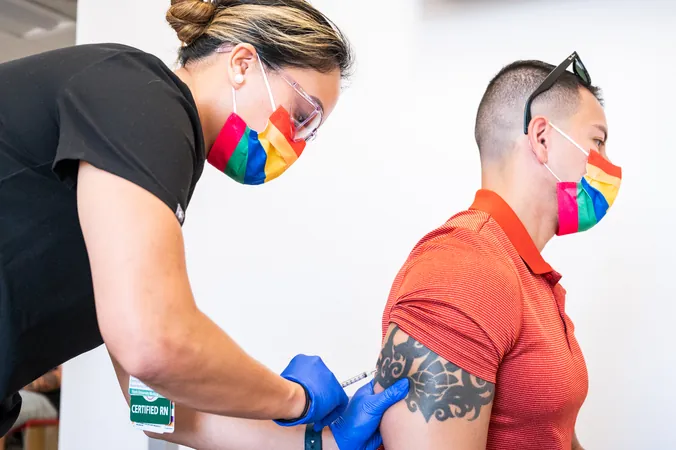
Urgent Vaccination Call in Chicago as Mpox Cases Surge
2025-09-22
Author: Jia
Spike in Mpox Cases Ignites Health Warning
Chicago is sounding the alarm as health officials report a staggering 81 new cases of mpox—previously known as monkeypox—over the last six months, with a shocking 90% of those diagnoses occurring since June 10. Just between September 9 and 15, 14 new cases emerged, highlighting a concerning trend.
Targeted Demographic: At-Risk Communities
This resurgence primarily impacts gay, bisexual, and same-gender-loving men within the city. Dr. Andrew Crone, an infectious disease specialist at Howard Brown Health, emphasizes the importance of vaccination in mitigating the severity of the illness.
The Importance of Vaccination
"Vaccination remains crucial in reducing the intensity of symptoms even if a person contracts the virus," Crone stated. Symptoms of mpox can range from mild rashes to excruciating pain, particularly affecting sensitive areas of the body. Anyone displaying signs of the illness should seek immediate testing and isolation.
Stay Prepared: The Health Department's Initiative
To combat the surge, the Chicago Department of Public Health is pivoting its focus to mpox vaccinations at clinics this fall, alongside flu and COVID vaccines. Locations like the city’s Sexual Health Clinics in Lakeview, Austin, and Roseland are ready to assist.
How Mpox Spreads: What You Need to Know
Understanding how mpox spreads is essential: it can be transmitted through direct skin contact, respiratory secretions from prolonged exposure, or through contaminated items. The CDC warns that infected individuals can spread the virus until their lesions completely heal.
Recognizing Symptoms: Know What to Look For
Key symptoms include a painful rash resembling pimples or blisters, fever, headaches, muscle aches, and swollen lymph nodes. Experts stress that the rash can be extremely painful, making it crucial to seek medical care immediately.
Steps to Take if You Suspect Mpox
If you think you might have mpox, isolate yourself and avoid contact with others. Steer clear of shared linens and intimacy until evaluated by a health professional. Reach out to healthcare providers or contact the health department for guidance on testing.
Vaccination Eligibility: Who Should Get the Shot
Vaccines are accessible to various groups in Illinois, including anyone who has had skin contact with an infected person, sexually active individuals within the LGBTQ+ community, and those living with HIV or at risk through PrEP.
Where to Get Your Vaccine
A map of vaccination clinics is available through the Chicago Department of Public Health. Clinics like Howard Brown Health offer vaccines through appointments and walk-ins across multiple locations.


 Brasil (PT)
Brasil (PT)
 Canada (EN)
Canada (EN)
 Chile (ES)
Chile (ES)
 Česko (CS)
Česko (CS)
 대한민국 (KO)
대한민국 (KO)
 España (ES)
España (ES)
 France (FR)
France (FR)
 Hong Kong (EN)
Hong Kong (EN)
 Italia (IT)
Italia (IT)
 日本 (JA)
日本 (JA)
 Magyarország (HU)
Magyarország (HU)
 Norge (NO)
Norge (NO)
 Polska (PL)
Polska (PL)
 Schweiz (DE)
Schweiz (DE)
 Singapore (EN)
Singapore (EN)
 Sverige (SV)
Sverige (SV)
 Suomi (FI)
Suomi (FI)
 Türkiye (TR)
Türkiye (TR)
 الإمارات العربية المتحدة (AR)
الإمارات العربية المتحدة (AR)